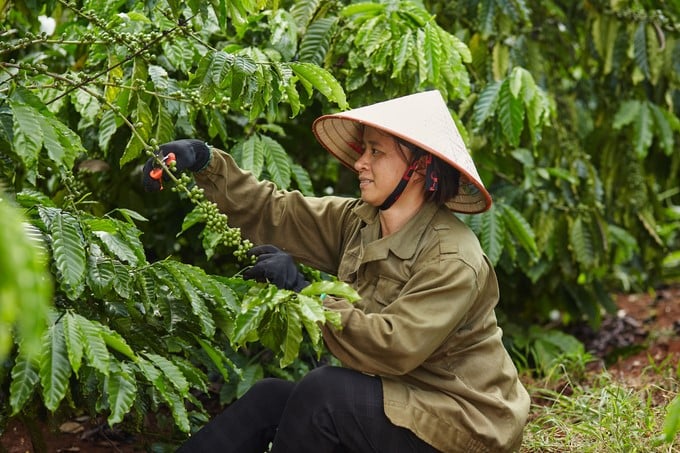November 21, 2025 | 23:01 GMT +7
November 21, 2025 | 23:01 GMT +7
Hotline: 0913.378.918
November 21, 2025 | 23:01 GMT +7
Hotline: 0913.378.918

Techniques shared in the Nescafé Plan program help reduce fertilizer and pesticide use by 20% while still ensuring crop quality and productivity. Photo: Nestlé.
This result was published in the 2023 Coffee Brew Index ranking of the Coffee Barometer report, which is conducted by a non-profit organization.
According to the report, Nestlé is evaluated as an enterprise with a comprehensive sustainability strategy in coffee production, including specific policies, goals, and actions in social, environmental, and economic aspects.
The 2023 Coffee Barometer report recognizes Nestlé's dedicated investment in the coffee industry. In addition to owning many brands and a diverse product catalogue, Nestlé also pays special attention to sustainable development right from farms through programs such as the Nescafé Plan, which focuses on combating climate change, conserving forests, and improving farmers' livelihoods.
Mr. David Rennie, Nestlé's Head of Coffee Brands, affirmed that this is recognition for Nestlé’s long-term commitment to sustainable development in coffee production.
"Through our core programs, including the Nescafé Plan and Nespresso AAA Sustainable Quality programs, we are accompanying farmers every day to ensure socio-economic sustainability in coffee farming and production. We are committed to continuously progressing and bringing new approaches to sustainable coffee farming," Mr. David Rennie emphasized.
In Vietnam, through the Nescafé Plan program implemented since 2011, Nestlé is supporting coffee farmers in converting to a regenerative, low-emission agricultural model with initiatives that help improve the quality of growing soil, protect water resources, and preserve biodiversity. Better soil quality will contribute to increasing resilience against the impacts of climate change and help absorb CO2.

Vietnamese farmers receive seedlings in the project "Sustainable coffee farming under the agro-forestry model," launched in June 2023. Photo: Nestlé.
At the same time, easily applicable innovations and techniques are shared by Nestlé's agricultural experts through the Nescafé Plan program, such as measuring soil moisture with a water bottle, using appropriate intercropping models, etc. This has helped coffee farmers save 40%–60% of the water used for irrigation and reduce fertilizer and pesticide use by 20% while still ensuring crop quality and productivity.
As of 2022, in the Nescafé Plan program in Vietnam, the majority of farmers in the total number of gardens surveyed had used microbial fertilizers to fertilize plants; 86% of coffee gardens had diversified crops with an average of three different types of plants. Thanks to that, farmers' income improved by 30–100% compared to before joining the Nescafé Plan.
In particular, the program also supports farmers in applying digitalization to farm management and sustainable coffee farming. Through application software, such as the Digital Farmer Field Book (FFB) management tool based on digital technology, farmers can effectively manage inputs such as water, fertilizer, etc., contributing to reducing emissions per kilogram of harvested coffee.
It is expected that the Nescafé Plan program being applied globally will contribute to Nestlé's overall commitment to reduce greenhouse gas emissions by half by 2030 and achieve net zero emissions by 2050.
At the same time, the program also aims to achieve the goal that by 2025, Nestlé will purchase 100% of its coffee from sustainable farming sources, of which 20% will be purchased from farming according to the regenerative agricultural model. This rate will increase to 50% by 2030.
Currently, although coffee is grown in more than 50 countries, the majority of the coffee supply comes from a small number of countries. In 2022, Brazil was the world's largest coffee supplier, contributing up to 40% of total coffee output. Vietnam ranked second, contributing 20% of the output. Vietnam is now one of the leading green coffee suppliers to Nestlé.
The 2023 Coffee Brew Index ranking published in the biennial Coffee Barometer report analyzes the sustainability strategies of the world's 11 leading coffee-producing enterprises.
The Coffee Barometer report was initiated by the Solidaridad International Development Assistance Organization and Conservation International Organization and implemented by a group of international experts on the coffee supply chain and industry (Ethos Agriculture).
In addition to evaluating the world's leading coffee-producing businesses, the Coffee Barometer report also cites current research, showing that warming weather as well as changes in the rainy season may cause a decrease in coffee output in places, including Costa Rica, El Salvador, Guatemala, Honduras, Nicaragua, Mexico, and Vietnam.
Translated by Huyen Vu Thu

(VAN) Results from the Sustainable Durian Model Project in Dak Lak have confirmed the critical role of Yara Viet Nam in transferring advanced nutritional solutions to farmers.

(VAN) In Tuyen Quang province, livestock farmers have introduced effective models and innovative practices that significantly strengthen African Swine Fever prevention and control efforts.

(VAN) This is the study conducted by IRRI and Can Tho University on the rice straw value chain in Mekong Delta showing an economic potential of more than 6.6 trillion VND/year.

(VAN) By participating in cooperative economics, many farmers in Tay Ninh have overcome hardship, mastered clean dragon fruit cultivation techniques.

(VAN) The crossbreeding program in the former Binh Dinh province (now part of Gia Lai) has shown signs of decline, and urgent measures are needed to revive it and sustain past achievements.

(VAN) The agricultural sector agreed on a roadmap to pilot the MRV protocol and expand low-emission rice production from the 2025-2026 winter-spring crop.

(VAN) Agricultural extension officers in Quang Ninh do more than transmit knowledge; they have become a steadfast support system for farmers on the path to sustainable agricultural development.